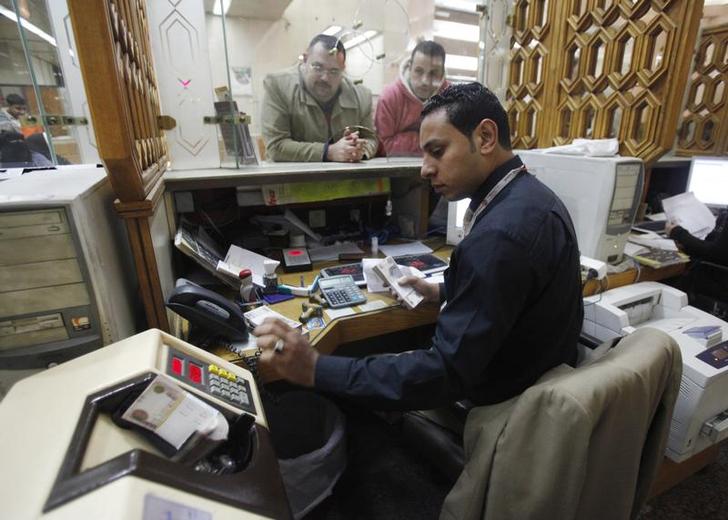Latest NEWS
- Aswat Masriya, the last word
- Roundup of Egypt's press headlines on March 15, 2017
- Roundup of Egypt's press headlines on March 14, 2017
- Former Egyptian President Hosni Mubarak to be released: lawyer
- Roundup of Egypt's press headlines on March 13, 2017
- Egypt's capital set to grow by half a million in 2017
- Egypt's wheat reserves to double with start of harvest -supply min
- Roundup of Egypt's press headlines on March 12, 2017
New Egypt bank rules to boost business lending and growth

An employee counts money at a bank in Cairo February 20, 2011. REUTERS/Suhaib Salem
CAIRO, Jan 11 (Reuters) - Egypt's central bank said on Monday it had amended credit market rules to encourage banks to lend to a wider range of clients, as part of efforts to mitigate credit risk and boost growth.
In a circular published on its website, the central bank cut the maximum amount that banks are allowed to lend to a single client to 15 percent of their Tier One capital, down from 20 percent previously, to reduce the risks associated with lending to a small number of large clients.
In a separate circular, it said that banks were also relying too heavily on retail lending, including personal, car and housing loans, and placed new limits on consumer credit.
It also cut the total sum that banks can invest in money market funds to 2.5 percent of their total deposits in local currency from 5 percent previously, a move bankers say could reduce their holdings of Egypt's high-yielding government debt.
The changes follow an announcement by the central bank on Sunday that it would push ahead with implementing President Abdel Fattah al-Sisi's plan to increase bank lending to small and medium-sized companies (SMEs) as part of efforts to boost growth and create private sector jobs.
"This will be good for the economy because it will encourage lending to SMEs and start the ball rolling in the economy and result in creating more jobs rather than just buying government debts," one banker said.
The Egyptian government has long been accused of crowding the private sector out of the credit market, with a huge chunk of bank funds being invested in treasury bonds and bills at yields reaching more than 14 percent for seven-year debt.
The consumer credit market has also grown, but business loans to private sector companies have lagged as banks have little incentive to offer what they perceive to be riskier loans and businesses balk at what they consider the high costs.
Economists have long said that a lack of financing to the private sector, particularly SMEs, has held back investment, job creation and ultimately growth in Egypt, whose economy has struggled since a popular uprising in 2011 drove away foreign investors and tourists.
It grew by about 4.2 percent in the last fiscal year and the government forecasts growth of around 5 percent in the 2015/16, although the World Bank has cut its projected growth rate to 3.8 percent due to weaker global growth.
The SME initiative will see banks lend 200 billion Egyptian pounds ($25 billion) to smaller businesses at interest rates not exceeding 5 percent. In return, participating banks will be permitted to reduce their level of required reserves held at the central bank.










